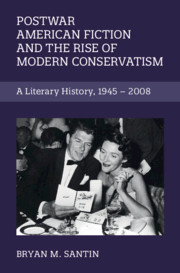Book contents
- Postwar American Fiction and the Rise of Modern Conservatism
- Cambridge Studies in American Literature and Culture
- Postwar American Fiction and the Rise of Modern Conservatism
- Copyright page
- Dedication
- Contents
- Acknowledgments
- Introduction
- Chapter 1 US Literature and the Modern Right at Midcentury
- Chapter 2 The Conservative Movement’s Foundational Fictions
- Chapter 3 The Strongbox of Custom
- Chapter 4 Movement Conservatism, Neoconservatism, and the New Right
- Chapter 5 The American Novel and the Reagan Revolution
- Epilogue: The Curious (Conservative) Case of Marilynne Robinson
- Notes
- Bibliography
- Index
- Cambridge Studies in American Literature and Culture
Chapter 2 - The Conservative Movement’s Foundational Fictions
Flannery O’Connor, Ayn Rand, and the Evolving Literary Forms of Conservatism, 1950–1964
Published online by Cambridge University Press: 27 March 2021
- Postwar American Fiction and the Rise of Modern Conservatism
- Cambridge Studies in American Literature and Culture
- Postwar American Fiction and the Rise of Modern Conservatism
- Copyright page
- Dedication
- Contents
- Acknowledgments
- Introduction
- Chapter 1 US Literature and the Modern Right at Midcentury
- Chapter 2 The Conservative Movement’s Foundational Fictions
- Chapter 3 The Strongbox of Custom
- Chapter 4 Movement Conservatism, Neoconservatism, and the New Right
- Chapter 5 The American Novel and the Reagan Revolution
- Epilogue: The Curious (Conservative) Case of Marilynne Robinson
- Notes
- Bibliography
- Index
- Cambridge Studies in American Literature and Culture
Summary
This chapter examines how the traditionalist wing of the conservative movement identified Flannery O’Connor as an important young writer who epitomized traditionalist conservatism’s faith in the sophisticated fiction of high culture. However, the chapter also shows how shifting conservative literary tastes could be discerned in movement conservatism’s contemporaneous reception of Ayn Rand. Unlike O’Connor and traditionalist conservatives who valued aesthetic form over abstract ideas, Rand and the libertarian conservatives at National Review who championed her novel Atlas Shrugged (1957) were concerned above all with advancing a firm set of ideological principles through the medium of fiction. While Buckley eventually ousted Rand from the conservative movement, her immense popularity with conservatives of the era foreshadowed the movement’s growing distrust of literary fiction and its eventual embrace of ideological purity and cultural populism. By close reading selected works by O’Connor and Rand, two fundamentally different fiction writers with material and symbolic linkages to the conservative movement, this chapter reveals not only the importance of fiction as a crucial nodal point in these debates, but also how racially fraught literary representations of totalitarian collectivism proved to be foundational for conceptualizing modern American conservatism.
Keywords
- Type
- Chapter
- Information
- Postwar American Fiction and the Rise of Modern ConservatismA Literary History, 1945–2008, pp. 56 - 91Publisher: Cambridge University PressPrint publication year: 2021



